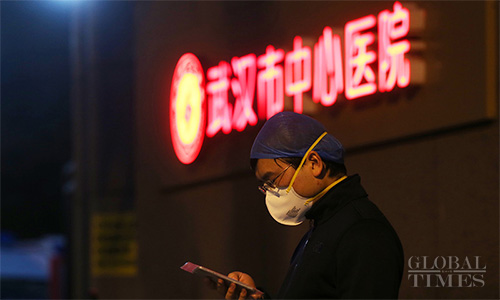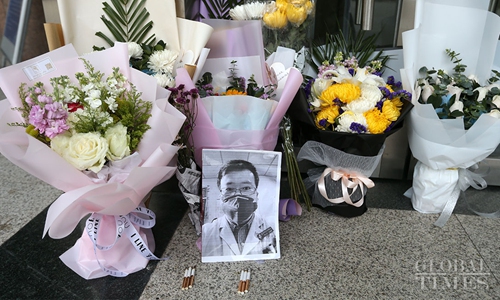HOME >> CHINA
Wuhan police urged to revoke virus ‘whistleblower’ Li Wenliang's reprimand order following probe
By GT staff reporters Source:Global Times Published: 2020/3/19 19:15:40 Last Updated: 2020/3/20 0:54:50
China's top supervision body on Thursday urged police in Wuhan, Central China's Hubei Province, to revoke a reprimand order against Li Wenliang, the "whistleblower" doctor who died from COVID-19, for alleged rumormongering, after more than 40 days of an investigation.
The release of the findings of the 42-day probe, which specifically centered on Li's case that has been highly politicized and used in attacks on China's political system, showed the Chinese government is committed to moving forward, while remains wary of such ulterior motives.
The investigation team sent by the central government on February 7 following Li's death also asked the local supervisory body to supervise the rectification of the matter, hold relevant personnel accountable, and timely announce the results.
The team also looked into the process of emergency treatment for Li, who nevertheless died on February 7. Confusion mounted about Li's death with some people questioning that whether the authorities attempted to delay announcing his death.
Li, one of the eight "whistleblowers" who tried to warn other medics of the coronavirus outbreak but was reprimanded by local police, died on February 7 after contracting the novel coronavirus pneumonia (COVID-19).

Photo: Cui Meng/GT
The investigation also revealed details concerning how Li contracted the disease, his treatment, the process of emergency treatment as well as compensation.
Doctors who took part in Li's emergency treatment were cited in the investigation report as saying that Li, as a young doctor, was also their colleagues, and no one wanted to give up on his treatment as long as there was hope. The doctors also their colleagues tried their best to save his life.
Medical experts who were consulted for Li's treatment said that the treatment of Li was standardized and doctors adjusted drugs and treatment measures based on Li's conditions. The hospital sought consent from Li and his families for all important medical treatment procedures throughout the process, the investigation report showed.
As an ophthalmologist who worked for Wuhan Central Hospital where he was also treated for the coronavirus infection, Li obtained a patient report suggesting positive SARS-like coronavirus signs on December 30. He shared the information in a group chat, saying that there had been seven confirmed cases of "SARS," according to one of his Weibo posts. On January 3, local police reprimanded him for spreading "online rumors" and required him to sign a letter of reprimand.
It turned out that the information they spread online alerting the public of the risks of people-to-people transmission was accurate, and the death toll of the disease has already exceeded that of the severe acute respiratory syndrome (SARS), the viral respiratory illness that battered China in the spring of 2003.

File photo: GT
Anger and grief flooded Chinese social media following Li's death, and many people hailed the man as a national hero and expressed indignation toward Wuhan authorities' handling of his case.
The probe only addressed issues related to Li. But it does not mean that the probe would stop there. Authorities would continue to probe other relevant matters such as inadequate epidemic response at the early stages of the outbreak and hold accountability, according to observers.
The grief expressed over Li's case has also been exploited by secessionists and foreign entities, which have spread anti-China sentiment on social media. It has become a source to share emotions and even outrage over Wuhan's handling of COVID-19 in the early stage, with some maliciously intending to use Li's death to incite "social movements" in China.
The US Senate passed a resolution honoring Li on March 3, calling for transparency and cooperation from the Chinese government. However, observers warned that foreign entities and forces are exploiting the grief the public expressed over Li's death and spreading anti-government rhetoric on social media.
But Li, as a Communist Party of China (CPC) member, shared the determination and spirit of self-sacrifice found among many other CPC members who are now fighting the tough battle against the disease, observers said
Between February 7 to March 12, the central government sent four teams to investigate different social events that attracted extensive public attention amid the COVID-19 outbreak, of which the findings from three teams have been released. The probe on Li's case took the longest as it was the most complicated one, they said.
According to Article 15 of Chapter III of the Supervision Law of the People's Republic of China, Chinese supervision organs are to conduct supervision of personnel engaged in managing public education, scientific research, culture and healthcare, sports and other such units.
The probe into Li's death and relevant matters is a "comprehensive investigation," as the team not only needs to investigate whether there was a mistake in the medical treatment of Li, but also needs to look into whether there was a deliberate concealment behind of the incident, or any abuse of power, in addition to failing to fulfill responsibilities among officials in epidemic prevention work, Ren Jianming, a professor at the School of Public Policy and Management at Beihang University in Beijing, told the Global Times.
Revoking the administrative decision restores Li's reputation, sending a clear message that when the virus battle nearly comes to an end in China, the country will enter a new phase of introspection, hold accountability, and fix its loopholes, which echo public sentiments amid great challenges, observers said.
Zhan Zhongle, a law professor at Peking University said there won't be any follow-up for state compensation for Li, because the admonished did not do him any physical harm, nor cause his death.
Moreover, media already cleared his name before, so the withdrawal of admonition is expected, Zhan said.
"The investigation should not be deemed merely as delivering a result, but should serve as a lesson for all," Zhan stressed.
"Take Wuhan police for example. They should introspect how to define rumormongering after they obtained relevant information," Zhan said, noting that Li's hospital officials should also be held accountable.
Posted in: SOCIETY